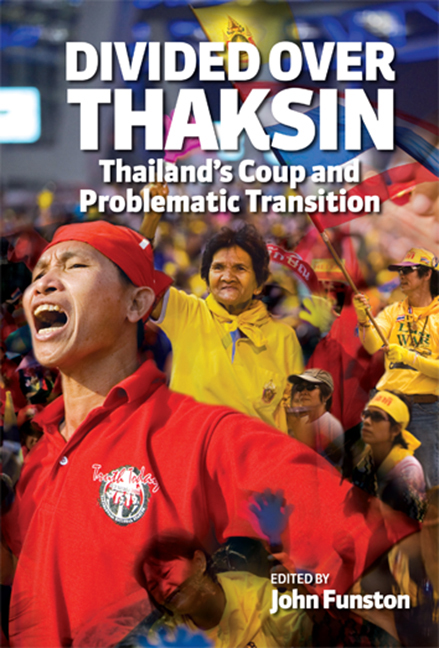Book contents
- Frontmatter
- Contents
- List of Tables and Figures
- List of Contributors
- Preface
- Introduction
- 1 Political Contests in the Advent of Bangkok's 19 September Putsch
- 2 The Tragedy of the 1997 Constitution
- 3 The NESAC, Civil Society, Good Governance and the Coup
- 4 Military Coup and Democracy in Thailand
- 5 Deconstructing the 2007 Constitution
- 6 Thailand's 2007 Constitution and Re-Emerging Democracy: Will Political Polarization Continue?
- 7 Untying the Gordian Knot: The Difficulties in Solving Southern Violence
- 8 Another Country: Reflections on the Politics of Culture and the Muslim South
- 9 Governance in the South: Is Decentralization an Option?
- 10 Tradition and Reform in Islamic Education in Southern Thailand
- 11 The Economy under the Thaksin Government: Stalled Recovery
- 12 The Thai Economy after the Coup
- 13 The Impact of Political Uncertainty on Business
- Index
3 - The NESAC, Civil Society, Good Governance and the Coup
Published online by Cambridge University Press: 21 October 2015
- Frontmatter
- Contents
- List of Tables and Figures
- List of Contributors
- Preface
- Introduction
- 1 Political Contests in the Advent of Bangkok's 19 September Putsch
- 2 The Tragedy of the 1997 Constitution
- 3 The NESAC, Civil Society, Good Governance and the Coup
- 4 Military Coup and Democracy in Thailand
- 5 Deconstructing the 2007 Constitution
- 6 Thailand's 2007 Constitution and Re-Emerging Democracy: Will Political Polarization Continue?
- 7 Untying the Gordian Knot: The Difficulties in Solving Southern Violence
- 8 Another Country: Reflections on the Politics of Culture and the Muslim South
- 9 Governance in the South: Is Decentralization an Option?
- 10 Tradition and Reform in Islamic Education in Southern Thailand
- 11 The Economy under the Thaksin Government: Stalled Recovery
- 12 The Thai Economy after the Coup
- 13 The Impact of Political Uncertainty on Business
- Index
Summary
Thailand' NESAC, or National Economic and Social Advisory Council, took its model from France, more or less. In French, they call it Conseil Economique et Social. According to this model, the council is an institutional representation of civil society. The council comprises many groups: employers, trade unions, farmers, consumers, professional associations, social associations and so on, which interact with the government. This is the concept. To do what? To bring the concerns of various sectors to the attention of the decision-makers; to provide a platform for dialogue among the diverse sectors of civil society; to minimize conflict; and to promote a culture of sharing and caring as well. So there are two or three big roles. I do not know whether the people in NESAC understand all this or not, but this was the original idea.
Actually more than fifty countries around the world have established advisory councils. However in East and Southeast Asia there are only three — in Thailand, China and South Korea. There are also councils at the regional level for the European Union — the European Economic and Social Committee — and in Latin America.
That, broadly, is the concept. Now, to NESAC itself. NESAC is mandated by Section 89 of the abolished 1997 constitution. Fortunately, there is a piece of legislation (see Appendix). According to the act, NESAC is an organization that echoes or mirrors economic or social concerns to the government, with no personal interest allowed or involved (ideally). It comprises the council and the office. The office, strangely, is a governmental department reporting directly to the prime minister but supervised by the NESAC chairman. The council has ninety-nine members, self-selected from a broad range of interest groups, who serve three-year terms. The make-up of the council is as follows: 50 members from the economic sector, industrial, agricultural and services; 19 from social organizations like women' groups, handicapped groups and the education and health sectors and so on; 16 members from the resource-based sector; and 14 “highly-knowledgeable persons” (see Appendix).
NESAC' role — and this is very formal — is to advise the government or the cabinet and to comment on government development plans. It can receive a request from the government, although so far this has happened only twice, or it can initiate advice.
- Type
- Chapter
- Information
- Divided Over ThaksinThailand's Coup and Problematic Transition, pp. 38 - 48Publisher: ISEAS–Yusof Ishak InstitutePrint publication year: 2009

